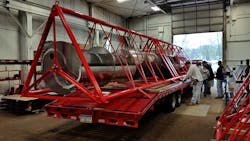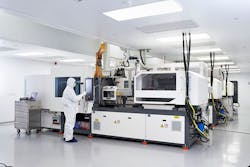Pittsburgh Has the Right Stuff When it Comes to Manufacturing
Why are top manufacturers like Alcoa (IW 1000/128), Allegheny Technologies (IW 1000/893), Bayer (IW 1000/75), Bombardier (IW 100/257), Eaton (IW 1000/962), H.J. Heinz, Koppers, LANXESS, NOVA Chemicals, PPG Industries (IW 1000/312) , U.S. Steel (IW 1000/271) and Westinghouse Electric investing in the Pittsburgh region?
Perhaps Richard J. Harshman, CEO, Allegheny Technologies Inc, explained it best.
“The Pittsburgh region is known worldwide for its manufacturing legacy,” said Harshman when announcing its $1.1 billion investment in a new hot rolling plant for specialty metals in 2008. “Today, that legacy continues with advanced manufacturing capabilities. The region’s advanced manufacturers are among the best in the world, which gives our region a competitive advantage in the global marketplace."
And that advantage is evident today as the region recently announced that advanced manufacturing racked up 68 projects in 2014, representing $450,234,500 in capital investment.
Growth of 3-D Printing
This isn’t news to GE (IW 500/7) who last year announced it will build its Center for Additive Technology Advancement (CATA) in the Pittsburgh region. The facility, representing a $32 million investment, is set to open at the end of this year.
“Advanced manufacturing is driving a profound change in industry and at GE,” Dan Heintzelman, GE vice chairman, said at the time of the announcement. “It is how we will compete and win in the future.”
CATA, which will become a hub for developing 3-D manufacturing technologies, plans to focus on improving the capabilities of using additive manufacturing across the company and advancing material sciences and inspection technologies.
GE’s new facility will join other 3-D industry leaders such as ExOne, one of the top 3-D equipment builders in the country, and threeRivers3-D, one of the top producers of 3-D scanners.
An important factor in GE's choice of location was that Carnegie Mellon University, the University of Pittsburgh and Penn State University all have research programs devoted to 3-D printing and other advanced manufacturing technologies. And within the great region, in Youngstown, is the National Additive Manufacturing Innovation Institute (NAMII).
NAMII, which is composed of a core group of manufacturers, research universities, community colleges and non-profit organizations throughout Northeast Ohio, Pennsylvania and West Virginia, was created in order to make the region a global center of excellence for additive manufacturing. Its purpose is to bridge the gap between basic research and product development for additive manufacturing, provide shared assets to help companies, particularly small manufacturers, access cutting-edge capabilities and equipment, and create an environment to educate and train workers in advanced additive manufacturing skills.
GE’s investment is part of robust manufacturing environment. Some 3,000 advanced manufacturing firms, manufacturing robots and turbines medical devices specialty metals employ nearly 96,000 people.
“This sector’s investment deals are creating and retaining high-wage jobs that support a robust supply chain that’s been created in the Pittsburgh region over the past 25 years.” said Pittsburgh Region Alliance CEO Dennis Yablonsky.
Part of the supply chain is clean tech manufacturing.
"Not only is green energy good for the environment, it's proving to be good for manufacturing and providing a sustainable career choice," said WindStax Wind Power Systems Founder Ronald Gdovic. The company designs and manufactures wind power systems using a blend of natural materials with modern processes and components for residential and commercial off-grid, microgrid and supplemental stationary power requirements.
"We're contributing to the overall manufacturing base and I think Pittsburgh committing to clean energy is good overall for the economic development strategy of the region," Gdovic told Pittsburgh Business Times.
Growth from Foreign Direct Investment
The region’s manufacturing sector is also attracting the attention of the global investment community. Last month the city was among the top ten American cities for foreign direct investment (FDI) by fDi magazine, a division of the London, U.K.-based Financial Times.
The region is home to 394 foreign-owned firms including BASF (IW 1000/36), LANXESS, Siemens (IW 1000/33) and Ansaldo. Among the deals were ones by foreign-owned firms such as Carclo Technical Plastics, the largest division of plastics injection molding company Carclo, plc, a U.K.-based manufacturer of plastic products. The company specializes in polymer gears, optics, high precision tooling and automation. Last year the company expanded its operations in the region to serve its pharmaceutical and automobile plastic injection molding operations.
In fact expansion of current business accounted for seven out of ten deals. “The expansion of existing businesses continues to be the backbone of the regional economy and accounts for the majority of announced deals, including in manufacturing where expansions accounted for 79% of all deals in that sector,” said Yablonsky.
Innovation from R&D
A factor in all of this expansion and investment activity is the R&D in the area. Annually, more than $1 billion in academic R&D in the region, including at two, Tier One research universities -- Carnegie Mellon University and the University of Pittsburgh -- drives a culture of innovation. This is complemented by another $1 billion annually in corporate R&D and $1 billion in government R&D across the region.
All of this collaboration is part of the way things are done in the area.
“Here in the Pittsburgh region, we continuously work in partnership with the public and private sectors and academia to compete and win, even as we create a new era of business innovation and growth” said Laura Karet, Pittburgh Regional Alliance chairperson and CEO of Giant Eagle Inc.
“Pittsburgh is rich in legacy strengths around manufacturing, energy and business support services – which are all as critical to the regional economy today as they were 150 years ago. Today we’re intersecting these strengths with innovation and technology to develop the products and processes of the future, which keep southwestern Pennsylvania on the global radar for both domestic and international business investment.”


